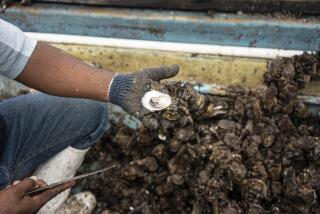Despite Cholera, Peru President Pushes Raw Fish
- Share via
LIMA, Peru — As the number of cholera victims climbed to more than 45,000, double the figure of a week ago, doctors criticized President Alberto Fujimori on Thursday for telling Peruvians that raw fish is safe to eat.
At least 193 people have died since the epidemic was first reported a month ago, officials said.
Fujimori and his wife have repeatedly been shown on television eating raw fish. The footage is meant to help the country’s slumping fishing industry, but the Health Ministry insists that raw fish may be contaminated.
“The president is handling a health problem politically,” one doctor said. Like other doctors who criticized Fujimori, he asked that his name not be used.
An epidemiologist at one hospital said that up to half of the cases he studied when the epidemic began were probably caused by eating ceviche, a popular dish made of raw seafood, onions, hot peppers and lemon juice.
With the fall in fish consumption, most cases are now transmitted by food bought on the street or by untreated tap water, he said. But he warned that, if the president’s example leads people to start eating ceviche again, there could be a resurgence of cholera caused that way.
The doctors said the number of cases reported in Lima has rebounded in recent days after falling steadily since early February. A resurgence was also reported in Chancay, about 10 miles north of Lima, as well as in coastal Trujillo and Chimbote.
The Health Ministry announced Thursday that 45,446 cholera cases had been reported in the country, nearly double the figures released last Friday. The death toll has risen by 59 since last Friday.
Also on Thursday, the Japanese Foreign Ministry announced in Tokyo that Japan will give Peru medical aid worth $167,000 to help fight the cholera epidemic.
The aid is in addition to $104,000 in assistance that Tokyo provided in February. It will be channeled through the Japan International Cooperation Agency.
Doctors interviewed in Lima hospitals said the numbers will keep rising if Peruvians continue to eat ceviche.
They said some local shellfish is probably contaminated by cholera. They said also that ceviche handled by a cholera victim is more likely than cooked food to transmit the disease.
A Fisheries Ministry spokesman said Peru’s huge domestic market for fresh seafood collapsed after the Health Ministry warnings.
Leaders of Peru’s powerful fishing industry, a major income earner, criticized Health Minister Carlos Vidal Layseca, even though his warnings were supported by international groups such as the Pan-American Health Organization.
The ministry has repeatedly said that frozen, canned and processed fish pose no health risk. But industry leaders said the warnings could cost Peru tens of millions of dollars in export earnings this year.
More to Read
Sign up for Essential California
The most important California stories and recommendations in your inbox every morning.
You may occasionally receive promotional content from the Los Angeles Times.













